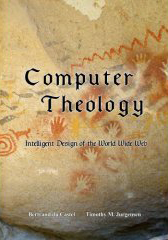PRESS
COMPUTER THEOLOGY |
||||
|
Acknowledgments This book has been a work in progress for
longer than we might like to admit. During the course of this work, we have
been privy to countless discussions with our friends and colleagues. We
gratefully acknowledge the contribution that these discussion have made to the
form and content of this work and we express our heartfelt thanks to all those
who so participated. There is always a risk when extending thanks to specific
people that some may be overlooked, and to anyone so offended we offer our
sincere apologies. However, we feel compelled to make special note of a few
people who have been especially generous with their time and thoughts on our
rather arcane endeavor. The authors would like to thank two
precursors in the field of computer theology, Anne Foerst in God in the Machine and Donald Knuth in Things a Computer Scientist Rarely Talks
About. They opened the door to us. Bertrand thanks Reid Smith and the
directors of the Association for the Advancement of Artificial Intelligence for
inviting him at the 2000 AAAI meeting to make a presentation which would become
the forerunner for this work. Then the students at the University of Maryland
at Baltimore County, Massachusetts Institute of Technology, University of Texas
at Austin, Purdue University, Peking University, Tsinghua University,
University of Hamburg, University of Grenoble and University of Paris, commented
on subsequent versions of the presentation that eventually led to this project,
when Tim offered that it was possible to transform this set of tentative ideas
into a comprehensive work of religion and science. I would like to thank the
computer security community that participated for so many years in several organizations
that I had the honor to found and participate in as chairman or president, in
particular the Java Card Forum, where Tim and I had the opportunity to not only
discuss the topics at hand, but also to launch this book in Berlin, Germany, in
2005. Finally I thank my former colleagues at Axalto, now Gemalto; and foremost
the management and the employees of Schlumberger, for their promotion of
fundamental values of scientific integrity that are as good for the business as
they are for the human adventure. I have a particular debt towards Schlumberger
Fellows Fikri Kuchuk and Mike Sheppard for penetrating critique. Eric
Abecassis, Guillermo Arango, Danièle Cuzin, Richard Dollet, Tim Finin, Thomas
Fisher, Zhian Hedayati, Philippe Lacour-Gayet, Mark Leveno, Robert Leydier,
Mathias Lorieux, Yi Mao, Yogi Mehta, Fiona Pattinson, Elena and Jean-Claude
Perrin, Guy Pujolle, Alain Rhelimi and Alain Sigaud contributed erudite
insights during discussions that, one way or another, shaped my thoughts. After
the long evenings and week-ends and all my ratiocinations, I owe so much for my
family support, which extended to helping elaborate parts of the book,
including cover design by Léonard, and picture by Clémente. Moreover, my wife Christine
suggested that Computer Theology is about Intelligent Design of the World Wide
Web.
Tim would like to acknowledge the seminal
discussions about the broader aspects of privacy and identity with Ken Binion
and Marilyn Binion. Discussions regarding religion and technology with Mike
Montgomery and with Ksheerabdhi Krishna were of great benefit. Gerry Smith was
an excellent sounding board for some of our early ideas, with the sidewalk cafés
of |
||||
|
||||
© Midori Press, LLC, 2008. All rights reserved for all countries. (Inquiries) The contents of ComputerTheology: Intelligent Design of the World Wide Web are presented for the sole purpose of on-line reading to allow the reader to determine whether to purchase the book. Reproduction and other derivative works are expressly forbidden without the written consent of Midori Press. Legal deposit with the US Library of Congress 1-33735636, 2007.
|
ComputerTheology Intelligent Design of the World Wide Web Bertrand du Castel and Timothy M. Jurgensen Midori Press, Austin Texas 1st Edition 2008 (468 pp) ISBN 0-9801821-1-5 |
Book available at Midori Press (regular) |
